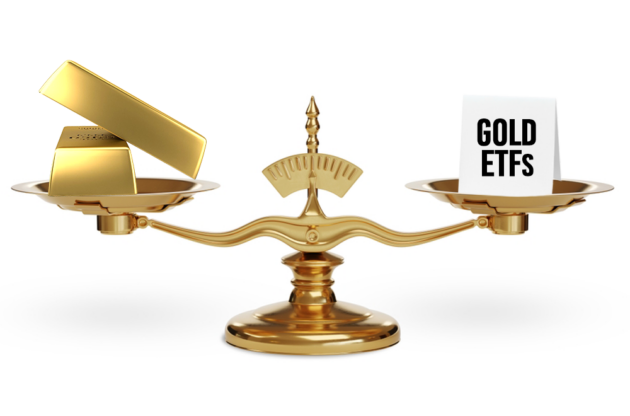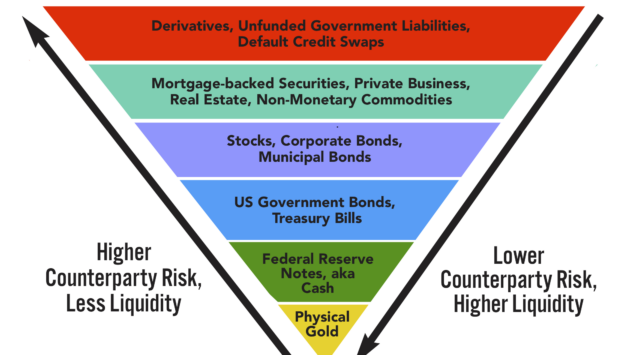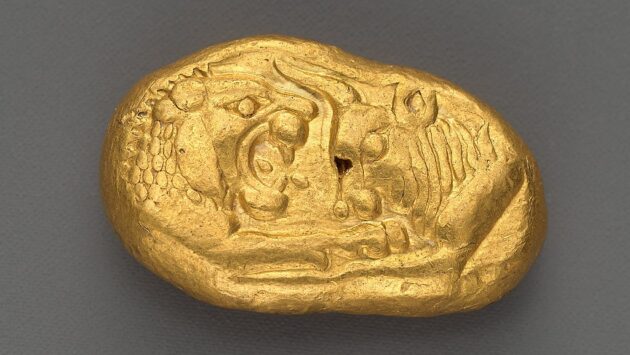
A tsunami of economic uncertainty is sweeping the globe.
In the US, we’re facing continued inflation, a falling dollar, loss of purchasing power, the Fed’s digital banking takeover, Biden’s tax hike agenda, market turmoil, a possible recession and more.
And folks who seek gold for wealth protection have two main options:
- Investing in gold ETFs (exchange traded funds)
- Owning physical gold
But which form is best?
To answer the question, let’s first clarify the difference between the two:
A gold ETF is a financial instrument — a paper proxy designed to track the price of physical gold. You don’t own the gold. Instead, you own fractional shares in an investment pool called a trust. The trust holds an unknown amount of gold, but it’s not 100% as you’ll see in a moment.
This arrangement may be an attractive option for those who believe a short-term market event could offer a profit opportunity.
But for long-term wealth protection, it may not be the best option.
The problem, as Forbes says, is the level of risk with ETFs: “Unlike physical gold bullion — which is a tangible asset — ETFs are a financial product that have counterparty risk. Counterparty risk is present when there’s a possibility the other party in an agreement will default or fail to live up to their obligations.”
Some of those counterparty risks include the decisions made by fund managers, the structure of the fund, the custodian of the gold, how the gold is delivered, how much gold the fund managers hold, the type of options they use to mimic the price movement of gold, and the bank vaults where they hold their gold.
With each additional decision maker, layer of complexity, and unknown variable, the risks compound and your level of control drops.
For example, if you wanted shares of the biggest and most popular gold ETF — SPDR Gold Trust (GLD) — you’d first have a tough time finding out how much gold they own. And it may shock you to discover it’s less than 9% of total funds.
Next, you’ll have to buy your shares through a large financial institution called an authorized participant. This authorized participant buys its shares from the ETF’s trustee. And the ETF trustee relies on a custodian to acquire and hold the actual gold.
Any or all parts of this arrangement and any participants in this complicated structure could develop problems, make mistakes or default.
And that’s just the first few layers.
Some trusts have multiple authorized participants, and some custodians employ “sub-custodians” … each with their own investment philosophies and actions.
This further amplifies the number of counterparty risks.
On top of all that, if the ETF’s balance falls below a certain threshold…
Or the shareholders don’t agree with the fund manager’s decisions…
Or the firm’s net asset value drops for any reason…
Or the amount of paper gold or the obligations the trust holds aren’t fulfilled when needed…
One little push and the whole setup could tumble like dominoes.
In stark contrast, owning physical gold carries no counterparty risk because you own the precious metal outright.
There are no extra layers of complexity. No unknown gold amounts. No authorized participants. No paper proxies. No brokerages or trustees who can make poor decisions. And no custodians with sub-custodians.
This is good.
Because the custodians of ETFs — the institutions who acquire and store the gold — are typically large banks.
As you know, banks can fail.
But it happens far more often than most Americans realize…
In fact, according to the FDIC “Failed Bank List,” 553 banks have failed since October 1, 2000.
Three of those happened in the first quarter of 2023. One of them was the second-worst bank collapse in US history.
A fourth bank failed on July 28, 2023. And a study by the Social Science Research Network found 186 banks remain at risk due to rising interest rates and an estimated $620 billion in unrealized losses.
This raises an important question:
How trustworthy is the custodian bank behind the biggest, most popular gold ETF (GLD)?
The custodian bank is the international financial juggernaut HSBC.
HSBCs troubles have faded from the news cycle, so most people don’t know this, but Business Insider revealed the giant was “fined $1.9 billion for money laundering and sanctions violations,” and…
- “The US Department of Justice said the bank allowed drug traffickers to launder billions of dollars in the US and billions more to be moved across borders to countries facing sanctions, including terror-ridden Libya.
- HSBC admitted to laundering $881 million for two drug cartels in Mexico and Colombia. It also accepted $15 billion in cash across the bank’s counters in Mexico, Russia, and other countries.
- It has set aside $1.3 billion to settle claims that it manipulated foreign exchange rates.”
As if concerns over bank behaviors weren’t enough…
Right now, the government’s runaway money printing is eroding the value of the US dollar, your purchasing power and your savings — fast.
But this is exactly what helps give physical gold its well-earned reputation as a store of wealth…
Your gold can’t go bankrupt.
A failed bank can’t wipe out your investment overnight.
And best of all…
When the dollar falls, the price of gold RISES.
For these reasons and more, the demand for gold is rising worldwide.
The world’s smartest money — global central banks — are now acquiring and storing physical gold in larger amounts and at a faster rate than they have in at least 50 years.
They know the US dollar is losing value…
They’re aware of the problems plaguing the traditional financial system…
They can see the global geopolitical and economic climate is under massive stress…
They understand the risks of holding paper golds vs physical gold all too well…
And they’re not buying gold ETFs — they’re only buying what they know they can physically hold and trust.
Bottom line
For people who want to protect their wealth long term…
The potential risks of buying paper shares of a gold ETF make the simplicity and potential benefits of owning physical gold the far more attractive option.
Business Insider agrees and warns:
“…there’s no reason to own a gold ETF.”
—————————-
Find out if protecting your wealth with physical gold is right for you with a FREE copy of our new Gold Information Kit. Or dial 888-529-0399 for a free consultation with a Gold Alliance Gold Specialist now.



